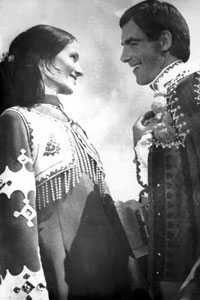Chervona Ruta (film)
| Chervona Ruta | |
|---|---|
 typical Bukovinian costumes (traditional folk art of Western Ukraine) | |
| Directed by | Roman Oleksiv |
| Produced by | Roman Oleksiv |
| Written by | Miroslav Skochilyas |
| Starring |
Sofia Rotaru Vasyl Zinkevych |
| Music by | V. Gromtsev, Volodymyr Ivasyuk (also lyricist), Levko Dutkivsky, E. Kolmanovsiki, Don Backy, B. Yanivsiki, M. Skorik |
| Distributed by | Ukrtelefilm |
| Release dates |
|
| Running time | 45 min. |
| Country | USSR, Ukrainian SSR |
| Language |
Ukrainian (songs) Russian (dialogue) |
Chervona Ruta is a 1971 Soviet Ukrainian musical film written by Miroslav Skochilyas and directed by Roman Oleksiv, starring Sofia Rotaru and Vasyl Zinkevych alongside popular Soviet Ukrainian ensembles. One of the first modern Soviet musical films, and the first modern Ukrainian musical filmed in Bukovina and the Carpathian mountains in the Ukrainian SSR, Chervona Ruta features short dialogues combined with legendary pop-folk songs in the Ukrainian language and characteristic Western Ukraine dances in modern pop choreography.
Translated from the Ukrainian, Chervona Ruta means "Red Rue". However, the expression became a proper noun and is generally not translated. The term Chervona Ruta derives from the old East Slavic legend, according to which the girl who will find Chervona Ruta on the Ivan Kupala Day, will be happy in love.
Plot
Oksana (played by Sofia Rotaru) is a young and beautiful Carpathian girl. On the "Donetsk-Verkhovyna" train she becomes acquainted with a young miner from Donetsk called Boris. The travellers fall in love, but are parted when they arrive at their destination. In the Carpathian mountains their paths diverge, but Boris (played by Vasyl Zinkevych, soloist of the instrumental band Smerichka) discovers where she is staying. The couple meet again and rekindle their love. Their friends invite them to perform in a concert for vacationers at a mountain resort,[1] where they sing of their feelings for each other.
Cast
- Sofia Rotaru as a young girl Oksana
- Vasyl Zinkevych as Boris, a young miner from Donetsk
- Volodymyr Ivasyuk
- Levko Dutkivsky
- Nazary Yaremchuk
- Anatoly Evdokimenko
- Alla Dutkivskaya
- Raisa Koltsa
Production
The idea to make a movie about Ukrainian pop-folk culture set in the Carpathian mountains arose from the fame of Smerichka and the popularity of the song "Chervona Ruta" in the Soviet Union. The original idea was to make a movie about Smerichka, using Vasily Zinkevich as the main actor (another soloist from the group, Nazary Yaremchuk, had also been considered). As there was no female leading actor in Smerichka the scenario was changed to a simple plot about a sudden blaze of love between Boris, an unsophisticated miner, and the Bukovinian beauty Oksana. By 1971 Sofia Rotaru was already a well-known singer in Bukovina both for her pop-folk songs and for her victory at the 1968 International Song Festival in Bulgaria. She was at that time a teacher at the Chernivtsi Musical College. When filming of the first Ukrainian musical started in Yaremche Rotaru was given the role of Oksana.
In the film Sofia Rotaru performs "Grey-winged Bird" - the Italian hit song Italian: Immensità, professionally translated in Ukrainian by Roman Kudlik, "Draw Me the Night" and "Autumn Is Close", and also (in duet with Zinkevych) "Vodohray".
The recording of "Vodohray" by the tenor Vasily and the alto Sofia was not used in the final version of the film. Instead Nazariy Yaremchyuk performed for Vasyl Zinkevych, and Mariya Isak performed for Sofia Rotaru. In the film Maria Isak appears fifth in the row of five girls, for a couple of seconds. It appears that the original performance had a defective soundtrack.[2]
The fact that the soundtrack for the song "Vodohray" was recorded by other singers was revealed only thirty years after. After the release of the television movie, the singers became unexpectedly famous in the USSR and in Eastern Europe. These seemingly amateur (but talented) singers became committed to the professional stage. Sofia Rotaru did change, and Mariya Isak had a son born to her and eventually withdrew from the stage to raise her family.
- Director producer: R. Oleksiv
- Scenario: M.Skochilyas, R. Oleksiv
- Sound operator: V. Strihovich
- Caneraman: A. Derbinyan
- Direcot assistant: A. Savchenko
- Cameraman assistant: A. Ermolichik
- Montage: V. Chernousova, N. Kovali
- Editor: T. Derzkaya
- Director: B. Dubitskiy
Soundtrack
- Following songs are performed in the film: "Spring Came", "On fast Trains", "No One's", "My Sweetheart", "Left Flowers", "Uncomparable World of Beauty", "Rier Runs", "If Love Is Over", "Greywinged Bird» (Ukrainian cover of Immensità), «Chervona Ruta», «Draw Me the Night», «Sweeps Stopped Fling», «You Will Return, Beloved», «Vodogray», «There, Where Mountains and Forests»
- Ensembles: "Eureka", "Karpaty", "Rosinka", "Smerichka", "Chervona Ruta"
- Composers: V. Gromtsev, Volodymyr Ivasyuk, L. Dutkovskiy, E. Kolmanovskiy, Don Backy, B. Yanivskiy, M. Skorika
- Text authors: M. Buchko, Volodymyr Ivasyuk, R. Ischyuk, A. Fartushnyak, V. Grigorak, R. Kudlik, M. Petrenko
| N°[3] | Song | Performed by | Authors | Commentaries |
|---|---|---|---|---|
| 1 | Spring Came Russian: Театр/Teatr |
Sofia Rotaru | Lyrics: Music: |
|
| 2 | On Fast Trains Russian: Говорят/Govoryat |
Sofia Rotaru | Lyrics: Music: |
|
| 3 | No One's Russian: Эхо верности/Ekho vernosti |
Sofia Rotaru | Lyrics: Music: |
|
References
- ↑ The Carpathian mountains are a popular Soviet/Ukrainian vacation resort for ski-ing in winter and rafting in summer.
- ↑ Chervona Ruta
- ↑ Chronological order
External links
- Chervona Ruta on YouTube
- Sofia Rotaru: secrets of her success, podrobnosti.ua
- Chervona Ruta at the Internet Movie Database
| ||||||||||||||||||||